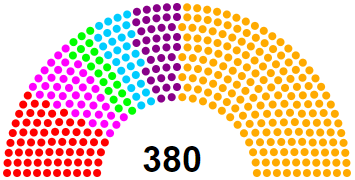National Assembly of Talenore
| File:None | |
| Name: | National Assembly |
| Legislature: | 2nd National Assembly |
| Houses: | Unicameral |
| Date founded: | 1665 |
|
| |
| Speaker of the National Assembly | Leila Merhaban, NDP |
| Deputy Speakers | Mikas Bevaaq, SDP Abbas Rajavi, NF |
|
| |
| Seats: | 380 |

| |
| Political groups: | Government (225)
Official Opposition (65)
Other Opposition (90)
|
|
| |
| Mode of election: | Party list proportional representation, d'Hondt method |
| Last election: | 12.XI 1668 |
| Next election: | 12.XI 1671 |
| Meeting place: | National Assembly Building, Regent's Park, Talenore |
The National Assembly is the supreme legislature of Talenore, established in 1665 by the Constitution of Talenore. It is located in Regent's Park in Metro Talenore. The unicameral parliament has 649 members, and is elected every three years based on party list proportional representation in twenty-six constituencies. A member of the National Assembly is known as a National Assembly Member (NAM).
The assembly is lead by a speaker and four deputy speakers: the presidium. The members are allocated to standing committees. Following the 1665 election, ten parties were represented in the assembly. During the first term a constitutional amendment was passed reducing the number of seats to 380 from 649. It also instituted a five percent threshold for representation. As a result, in the 1668 elections the National Development Party came four seats short of a majority, continuing their coalition government with the National Front. In the opposition, four parties were eliminated and a new party gained represenation. The Socialist Workers' Party were 35,000 votes from retaining their representation in the Assembly. The Conservative Party and the Democratic Rally both saw their support collapse and with around 1.5% of the votes they both got eliminated. Bright Dawn lost its two seats but still saw a 50 percent rise in support. Finally, the Humanist List gained represenation in the Assembly with just over five percent of the vote. Leila Merhaban and all four deputy speakers were reelected.
History
Procedure
Legislative
Promulgation
Organisation
Seats per Governorate
| Governorate | Seats | Governorate | Seats | Governorate | Seats |
|---|---|---|---|---|---|
| 24.VIII | 9 | Harbour | 11 | Regent's Park | 8 |
| Alexandria Town | 11 | Independence Plaza | 6 | Shahrdari | 10 |
| Ardashir City | 16 | Ken Lee Hills | 13 | Shotaki | 13 |
| Blue Valley | 13 | Little Elwynn | 9 | Slaughterhouse | 21 |
| Cedar Gardens | 7 | Marwarad Shahr | 12 | Talota Hills | 9 |
| Central | 13 | Morningside Heights | 15 | Tosha | 5 |
| East Bay | 22 | Northern | 20 | Vinfetto Avenue | 23 |
| Eastern | 17 | Pasdaran | 15 | White Hill | 20 |
| Hangman's Corner | 10 | Qarb Town | 12 |
Presidium
The business of the assembly is managed by the Speaker, assisted by four deputy speakers. The speakers are elected by the assembly and serve for the entire term, unless they resign. By convention, the five offices are divided amongst the parties of the assembly roughly according to size, with usually three seats going to the majority and two seats to the minority. According to the standing orders of the assembly, the presidium is not a collegiate body. It is largely the Speaker that manages the assembly docket. The deputy speakers must be consulted though.
Standing committees
Further information: List of current Talenore National Assembly committees
The business of the assembly is handled by a number of standing committees. Each committee is responsible for a set of either legislative or procedural issues. Their makeup roughly correspond to the strength of the parties in the assembly, except for certain committees. The governing party or coalition usually has a majority of the seats. Each committee is headed by a chairperson from the committee majority and a ranking member from the opposition. The ranking member does not chair the committee, but has the right to be consulted regarding major issues dealt with by the chairperson. The committees deal with public policy, government scrutiny, internal matters and constitutional compliance.
Party groups